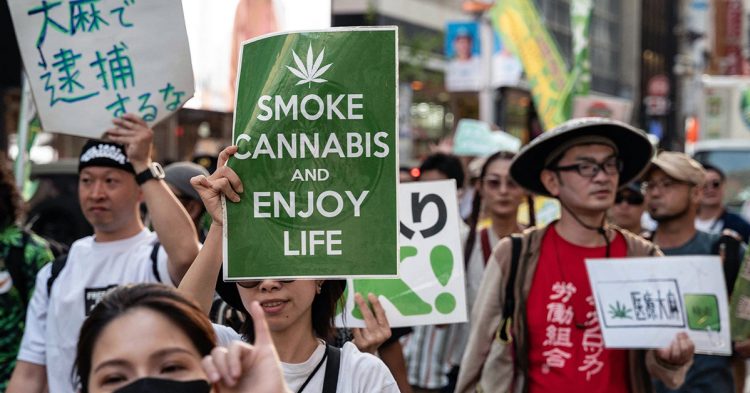Japan’s cannabis law will soon criminalize recreational use while legalizing medical cannabis treatments.
The new law, announced last week, is set to take effect on December 12.
While the possession and cultivation of marijuana have long been illegal in Japan, the updated law will now also prohibit its use, imposing prison sentences of up to seven years for those caught violating the law.
Currently, Japan does not impose specific penalties for the personal use of cannabis, in part to protect farmers who might come into contact with cannabis by accident while growing hemp for industrial purposes. However, growing concerns that the lack of penalties for cannabis use is fueling drug abuse among young people has led to this change in policy.
In 2023, a record 6,482 individuals were investigated in Japan for cannabis-related offenses, an increase of 1,140 from the previous year. Police data show that over 70% of those involved were teenagers and young adults in their 20s, according to a report by Kyodo News published earlier this year.
At the same time, Japan’s cannabis law will permit the medical use of cannabis-derived products, a shift from current rules that only allow cannabis medications in clinical trials. Advocacy groups have been pushing for the approval of cannabis-based CBD medicines like Epidiolex, which are already approved in Europe and the United States for treating severe epilepsy, according to the Bangkok Post.
This policy change marks a major shift in Japan’s cannabis law, as it attempts to balance international advancements in medical cannabis and local concerns over increasing drug misuse, particularly among younger generations.
The new rules follow years of discussion and research by government committees, especially from 2020 to 2023. These studies examined the growing use of cannabis among Japan’s youth as well as the expanding medical applications of the substance.
The new legislation officially permits medical cannabis use, marking a significant change from Japan’s former complete ban. It also classifies cannabis use as a criminal offense under the Narcotics Control Act, treating it similarly to other controlled substances. This means that activities like possession, use, or importing cannabis now carry penalties similar to those for narcotics.
Previously, penalties in Japan were focused on possession and trafficking rather than use. The revised law now treats cannabis consumption as a criminal activity, with prison sentences possible. This shift was motivated by the rise in cannabis-related offenses, especially among young people, reflecting a worrying trend of misuse.
The new regulations also tighten control over cannabis cultivation. Farmers will need specialized licenses depending on the type of cannabis they grow. A “Type 1 license” is required for cannabis intended for industrial use, while a “Type 2 license” is necessary for cultivating cannabis for pharmaceutical purposes. Cultivators must meet strict THC limits, and the Minister of Health, Labour, and Welfare must approve any research activities or seed imports.
While Japan’s cannabis law now allows for medical cannabis, the government will tightly regulate these products as narcotics to ensure they are used strictly for medical purposes.
Despite these updates, the government emphasizes that Japan’s long-standing hemp culture will remain intact. The legal use of hemp in traditional ceremonies will continue to be permitted under the new law.
UNRELATED NEWS: Over 1,000 Arrested in U.K. Cannabis Grow Operation Crackdown









